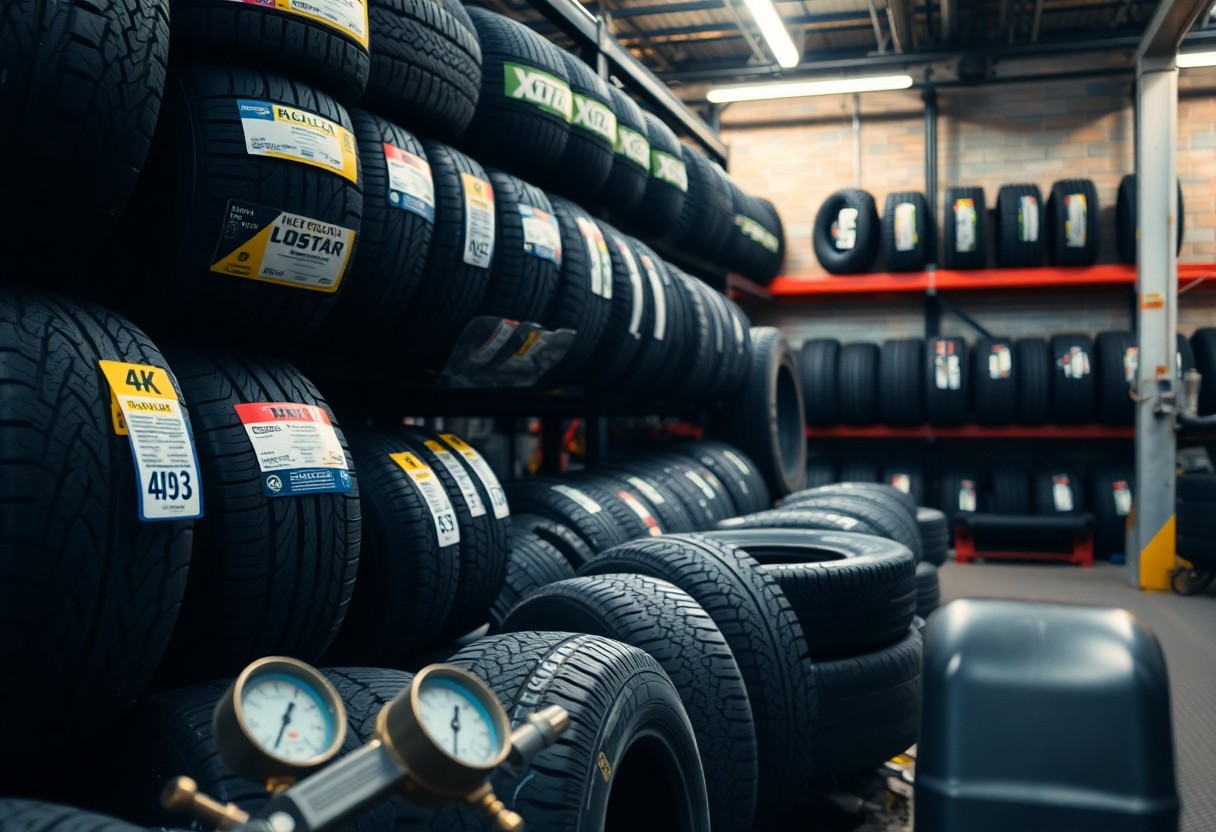Many factors influence your decision when selecting the right tyres for daily city driving. It’s imperative to consider weather conditions, tyre performance, and durability to ensure your safety on the road. Choosing tyres with good grip and efficient handling enhances your driving experience while reducing the risk of accidents. Additionally, understanding the correct size and specifications for your vehicle guarantees optimal performance, so you can navigate urban environments with confidence.
Key Takeaways:
- Consider the climate and weather conditions in your area.
- Choose tyres with good tread life for cost-effectiveness.
- Opt for tyres offering comfort and noise reduction for daily driving.
- Prioritize fuel efficiency ratings to save on gas.
- Check for compatibility with your vehicle’s specifications.
- Look for tyres that provide adequate grip for city driving conditions.
- Read reviews and ratings for insights on performance and durability.
Decoding Your Driving Environment
Your driving environment plays a significant role in selecting the right tyres. City driving involves unique demands such as frequent stops, sharp turns, and varying surface conditions. Understanding these factors will help you choose tyres that enhance your vehicle’s performance and safety. Look for tyres designed specifically for urban use, providing traction and durability on the unpredictable terrain of urban roads.
Analyzing Urban Roads and Their Challenges
Urban roads present specific challenges like potholes, uneven surfaces, and heavy traffic. These conditions can wear down tyres quickly if they aren’t designed for durability. Opt for tyres with reinforced sidewalls which can better handle the stress from sharp turns and sudden stops. Adequate grip on asphalt and concrete is necessary for maintaining control, especially during high-frequency braking and acceleration.
The Role of Weather in Tyre Selection
Weather significantly impacts tyre performance, especially in urban settings where rain and temperature fluctuations are common. Select tyres that maintain grip under wet conditions to prevent hydroplaning and improve stopping distances. All-season tyres can offer versatility, but dedicated summer or winter tyres may provide superior performance in extreme temperatures and wet conditions.
Consider your local climate. If you experience heavy rain or snow, dedicated tyres can enhance safety and handling. For example, winter tyres are designed with deeper treads and softer rubber compounds that remain flexible in low temperatures, enhancing traction on slick surfaces. Alternatively, a good all-season tyre can be suitable if your area has mild weather, offering balanced performance throughout the year while ensuring longevity.
Key Performance Factors for City Tyres
Choosing the right tyres for city driving involves several key performance factors that enhance both safety and comfort. Focus on traction, handling, longevity, and noise levels. High-quality tyres can significantly improve your driving experience, providing stability on urban roads and in varying weather conditions. After evaluating these elements, you’ll be better positioned to select tyres that suit your daily commutes.
- Traction
- Handling
- Longevity
- Noise Levels
Traction and Grip in Urban Conditions
Your city tyres must offer optimal traction and grip to handle regularly wet, uneven, and often debris-laden roads. A tread pattern designed for urban environments maximizes contact with the surface, ensuring responsive handling during abrupt stops and turns. Consider tyres with a softer rubber compound that excels in urban conditions for enhanced grip and braking performance.
Longevity and Tread Wear Considerations
Longevity and tread wear are vital when selecting tyres for city driving. Tyres that wear evenly can extend your budget by reducing the frequency of replacements. Look for options with a deeper tread depth and durable materials to withstand the constant starts and stops of urban environments.
Tyres typically last anywhere from 30,000 to 70,000 miles, depending on your driving habits, vehicle type, and maintenance. Regularly checking the tread depth will allow you to identify whether the tyres need replacing. Utilising tools like the penny test can help assess tread wear; inserting a penny into the tread and checking if Lincoln’s head is visible indicates it’s time for new tyres. Investing in tyres with a solid tread warranty improves your long-term value by ensuring you get the expected mileage.

Sizing Up: Don’t Skimp on the Right Fit
Choosing the correct tyre size isn’t just about aesthetics; it directly influences your vehicle’s handling, fuel efficiency, and safety. An ill-fitting tyre can lead to uneven wear and potentially dangerous driving conditions. Always refer to your owner’s manual and adhere to the manufacturer’s specifications for tyre size, including diameter, width, and aspect ratio, ensuring a perfect match for your vehicle.
Understanding Tyre Specifications for Your Vehicle
Your vehicle’s tyre specifications, such as the sidewall code and load index, dictate the type of tyres that will perform best. The sidewall code provides details on the tyre’s width, aspect ratio, and construction type, while the load index indicates the maximum weight a tyre can support. Proper matching of these specifications enhances performance and safety.
The Impact of Tyre Width and Profile
Tyre width and profile considerably affect your vehicle’s grip and responsiveness. Wider tyres typically offer better traction and stability, especially during cornering, while a lower profile aids in enhanced handling due to reduced flexing. Your choice should balance between aesthetic appeal and performance; consider how often you navigate sharp turns or uneven surfaces in city environments.
Opting for wider tyres can enhance grip but may contribute to a stiffer ride, as they can absorb less shock from road imperfections. For example, moving from a 195mm to a 215mm width could enhance cornering stability but might increase road noise and decrease comfort on bumpy city streets. Lower profile tyres, while improving handling, may also increase the risk of damage from potholes—a common urban hazard. Assess your driving habits and priorities when selecting the perfect compromise between width, profile, and performance.

Budgeting for Quality: Finding the Balance
Prioritizing quality in tyre selection often means adjusting your budget. Investing in reputable brands typically ensures better performance and longevity, which can save money in the long term. While premium tyres may have a higher upfront cost, their durability, safety features, and handling capabilities provide significant value. Aim to balance affordability and quality by researching options and comparing features to avoid compromising safety for price.
The True Cost of Cheap Tyres
Opting for cheap tyres may seem like a quick way to save money, but the hidden costs can accumulate rapidly. These tyres often wear out faster, reducing lifespan and requiring earlier replacements, leading to more frequent expenses. Moreover, poor performance can result in compromised safety and reduced fuel efficiency, which ultimately affects your overall budget.
Value vs. Price: Assessing Long-Term Investment
Assessing the value of a tyre extends beyond its initial price tag. High-quality tyres, despite their higher cost, offer improved longevity and safety features that enhance your vehicle’s performance. Investing in reliable tyres can minimize maintenance costs and lower the likelihood of accidents, yielding a higher return on your investment over time. By prioritizing value, you ensure that your daily driving experience remains safe and economical.
More specifically, quality tyres yield substantial benefits that outweigh their price difference. For example, a study found that premium tyres can last up to 50% longer than budget options, translating to fewer replacements and lower cost per mile. Additionally, features like improved grip and enhanced wet weather performance directly contribute to safer driving, reducing the risk of accidents that may incur costly repairs and insurance claims. Investing in quality tyres can thus enhance your overall driving experience while safeguarding your finances in the long run.

Making the Wise Choice: Choosing the Right Brand
Selecting the right tyre brand can significantly impact your daily driving experience. Renowned manufacturers invest heavily in research, technology, and superior materials to enhance their products. Opting for a reputable brand often guarantees better performance, safety features, and durability, crucial for city driving. Prioritize brands with proven track records and extensive warranties, providing peace of mind and potentially fewer headaches in the long run.
Importance of Brand Reputation in Tyre Performance
A tyre’s performance heavily depends on the manufacturer’s reputation. Established brands undergo rigorous testing, ensuring optimal grip, tread performance, and longevity under various driving conditions. For instance, top brands often feature advanced technology, enhancing wet and dry traction, while lesser-known ones may compromise on safety and durability, leading to unsafe driving conditions.
Exploring Reviews and Expert Recommendations
Dive into consumer reviews and expert evaluations when selecting your tyres. Engaging with online communities and automotive publications can illuminate the real-world performance of different brands and models. Pay special attention to feedback regarding handling, noise levels, and wear rates, as these factors directly influence your driving experience.
Expert recommendations often come from extensive evaluation tests, providing an accurate assessment of tyre performance across various metrics. For example, publications like Consumer Reports or auto magazines conduct rigorous simulations, offering insights on wet handling, tread wear, and comfort levels. Cross-referencing consumer feedback and expert opinions can help you make an informed decision, ensuring you select a tyre that meets your daily driving demands and enhances your overall driving experience.
Summing up
Conclusively, selecting the best tyres for daily city driving involves considering your driving habits, local climate, and the type of vehicle you own. Look for tyres that offer balanced performance in wet and dry conditions, prioritize comfort, and ensure low noise levels. Pay attention to tread patterns that enhance traction and longevity. Additionally, don’t overlook the importance of proper maintenance to extend the lifespan of your tyres. By following these guidelines, you can enhance your driving experience and ensure safety on the road.
FAQ
Q: What factors should I consider when choosing tyres for city driving?
A: Key factors include tyre size, tread pattern, noise levels, durability, and price. Consider comfort and performance for city conditions.
Q: How does tread pattern affect performance in urban environments?
A: A tyre with a symmetrical or ribbed tread pattern provides better stability and handling on smooth, dry surfaces common in cities.
Q: Why is fuel efficiency an important consideration for city tyres?
A: Tyres designed for low rolling resistance can enhance fuel efficiency, saving money on fuel during frequent stop-and-go traffic.
Q: How do seasonal tyres impact city driving?
A: All-season tyres offer balanced performance in varying weather, while dedicated winter tyres provide enhanced grip in icy conditions, ideal for seasonal changes.
Q: What is the significance of noise levels in city tyres?
A: Lower noise levels improve driving comfort, especially in urban areas with constant traffic, enhancing the overall driving experience.
Q: How should I assess the durability of tyres for city use?
A: Look for tyres with robust construction, quality materials, and a higher treadwear rating to ensure longevity and resistance to daily wear.
Q: Can I prioritize cost over quality when selecting tyres for city driving?
A: While price is important, investing in higher quality tyres may provide better performance, safety, and value over time compared to cheaper options.
